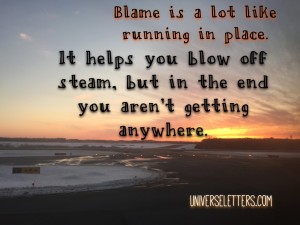“Shame, blame, disrespect, betrayal, and the withholding of affection damage the roots from which love grows. Love can only survive these injuries if they are acknowledged, healed and rare.” ~Brené Brown
Dear Universe,
We all know somebody that is a perpetual blamer. When something goes wrong in life, he’s quick to throw the blame and the shame elsewhere.
It doesn’t matter what the situation is, but this person never sees anything as his fault and never takes responsibility for his actions.
He complains, he blames, and he names everyone and everything else as the reason why something hasn’t gone in his favor.
It seems like no matter how much rational thought or advice we give this person, he can’t hear it over the blame game going on.
It’s exhausting to see, watch and listen to.
Newsflash: I know at some point or another we’ve all been a complainer, blamer and namer too.
The truth is yes: sometimes things aren’t our fault. Sometimes people do bad by us or something doesn’t go the way we wished it to. Sometimes we get what we don’t deserve and it stinks.
That’s life.
But the truth is also this: some things are our fault—or at least partly our fault. Sometimes we don’t see that we may have played more of a part in the occurrences in our lives than we care to admit.
So why the blame game?
It’s easy to throw our hands up in the air and act like everything is out of control (even if deep down we don’t believe that). It’s easier to point the finger at someone else when something’s gone wrong (even if deep down we know that’s not entirely fair). It’s much harder to turn that finger towards ourselves, look in the mirror and know we may have played a part in something we don’t want (it’s hard to admit we’re not perfect).
We are quick to take credit for the successes in our lives. That’s easy and it feels good. When things don’t go the way we want them though, it’s harder to acknowledge our role.
What if the next time something doesn’t pan out, we dig a little deeper and take a look at ourselves too?
That’s not to say that someone or something else isn’t a factor. It’s just to recognize we may be somewhat responsible too.
For instance, I have a friend who dated someone for about a year. Things were going great—she thought. Things were progressing forward—she thought. They were probably on their way to an engagement—she thought.
But then, the boyfriend abruptly broke up with her. Months later he was engaged to someone else and she was single and confused.
It would have been easy for her to point the finger at this boyfriend for their relationship turning sour—and at first she did.
But months later, as time and perspective kicked in, she realized something.
She was partly to blame for the break-up too. She acknowledged that she never spoke up and voiced what was on her mind—love, an engagement, marriage, children. She had done a lot of assuming in the relationship, not questioning things she maybe should have.
Instead of just blaming her ex for the rest of her life, which would make things easier in the short term, she decided to take a look at her role in this.
It wasn’t fun and it wasn’t easy. She had to dig deep to understand why she kept things to herself. As she came up with reasons why she hadn’t vocalized her feelings, she also realized that there had been a similar pattern with other men she’d dated.
She stopped blaming her ex and started to take back control over what had happened.
Here’s the key. She didn’t take on some of the blame to make things easier for her exes. She took on some of the blame to make things easier for herself.
Once she recognized the pattern and her part in it, she was able to work on something she never had done before—voicing her feelings. In her current relationship she’s able to share and ask questions and simply be more honest than she ever was before.
Blame is a lot like running in place. It helps you blow off some steam, but in the end you aren’t getting anywhere. (Tweet that!)
So the next time you find yourself playing the blame game, take some time to take a deep breath, call a timeout, and reflect to see if there’s anything you could learn from this.
It’s not easy to admit when we’re wrong, but it’s important we do. Doing that work will help us build to our higher selves and push us forward as we move on to the next adventure.
Newsflash: That’s a lot more productive than any blame game.
With Gratitude,
A

